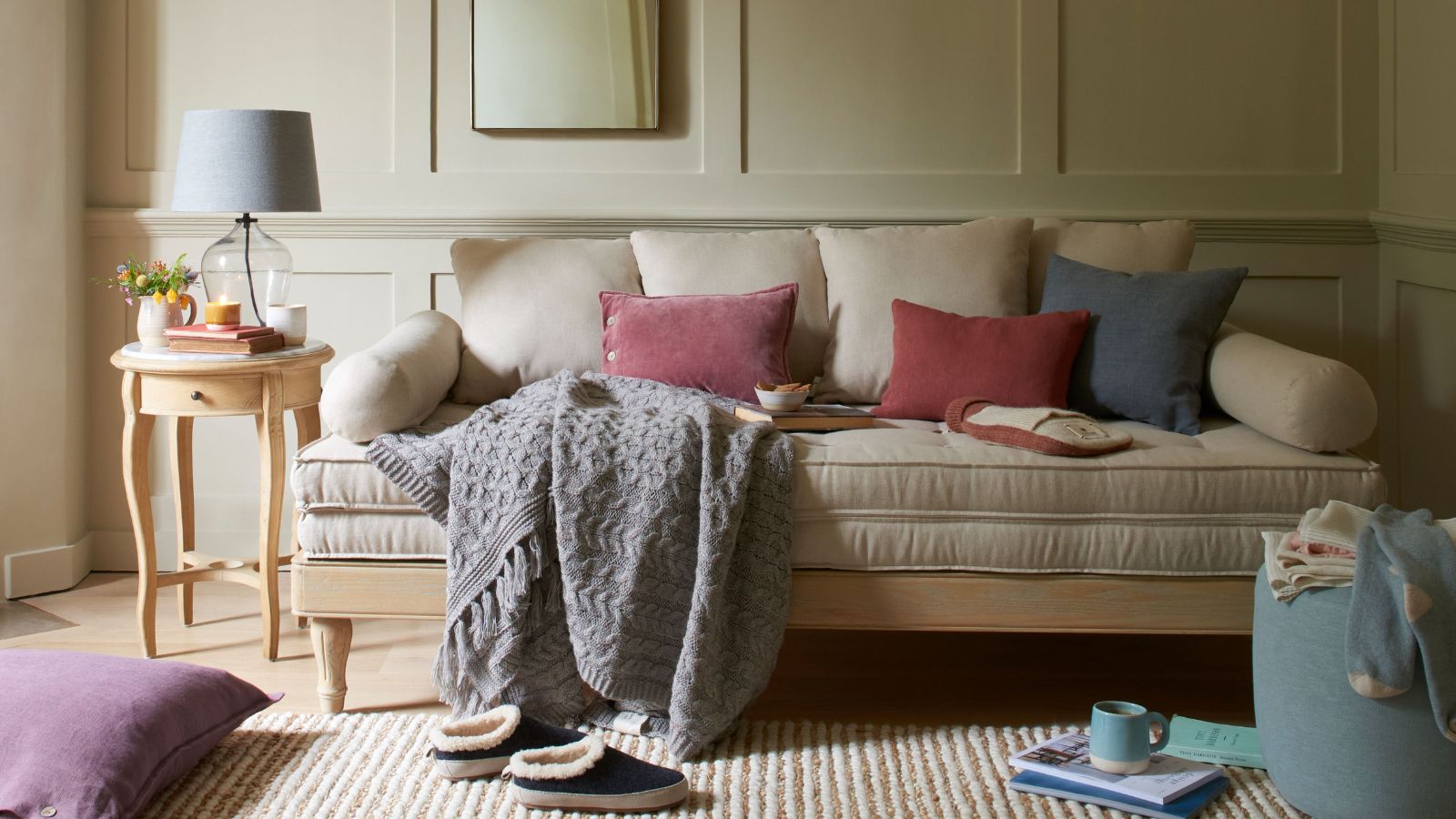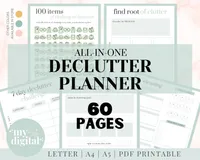How to make letting go of stuff easier – decluttering experts share their tricks
From decision fatigue to decluttering regret – here’s how the pro’s make letting go a little easier


Design expertise in your inbox – from inspiring decorating ideas and beautiful celebrity homes to practical gardening advice and shopping round-ups.
You are now subscribed
Your newsletter sign-up was successful
Want to add more newsletters?

Twice a week
Homes&Gardens
The ultimate interior design resource from the world's leading experts - discover inspiring decorating ideas, color scheming know-how, garden inspiration and shopping expertise.

Once a week
In The Loop from Next In Design
Members of the Next in Design Circle will receive In the Loop, our weekly email filled with trade news, names to know and spotlight moments. Together we’re building a brighter design future.

Twice a week
Cucina
Whether you’re passionate about hosting exquisite dinners, experimenting with culinary trends, or perfecting your kitchen's design with timeless elegance and innovative functionality, this newsletter is here to inspire
Letting go of our belongings is an emotionally draining process, so how do you make letting go of stuff easier?
Whether you are decluttering sentimental items, or looking to avoid decluttering regret, finding good coping mechanisms before you start the decluttering process is essential to making the task flow more smoothly and keeping your emotions in check.
These are the four ways the experts make letting go simpler, and why each approach works.
How to make letting go of stuff easier
One of the best decluttering tips professionals always share is to plan out a good approach to letting go before you pick up a trash bag to declutter. Putting coping mechanisms into your decluttering plan can help prevent you from becoming overwhelmed and giving up halfway through.
Here’s what the experts suggest trying:

1. Don’t set yourself too strict a timeline
When setting out your decluttering checklist, it can sometimes help to give yourself a time frame to initially clear out the space. When dealing with tough-to-let-go-of items, however, Raychel Klein, professional organizer and CEO of RayBayBay Home Organization, suggests relaxing this timeline to give yourself time to process:
‘Don’t pressure yourself into a timeline. The accumulation of belongings happens over the years, so to try to tackle it overnight (or even in a week) can feel like a losing battle. Be gentle with yourself so you can make decisions mindfully.
Design expertise in your inbox – from inspiring decorating ideas and beautiful celebrity homes to practical gardening advice and shopping round-ups.
‘When I can sense that my clients are getting tired and/or start to have a dismissive attitude, I recommend switching tasks or taking a break. The last thing I want is for a client to get rid of things because they want to “get it over with” and then later regret discarding something. Decision fatigue is inevitable, and it’s important to acknowledge when you’ve reached that point.’

Raychel Klein started her home organization business in 2020 with the mission of helping people escape the vicious cycle of clutter. She is a certified KonMari consultant based in Seattle, Washington.
2. Pass the item onto a new home
Sometimes, just knowing what to do with the items you are decluttering can be enough to make the letting-go process a little less draining, shares Brenda Scott, professional organizer and owner at Tidy My Space. Passing your items onto a new home that will find good use of it can help to settle any regrets you might have, she says:
‘Can a charity, school, seniors home, or family shelter use this? Call around to see what they could use and let your stuff go to make their lives better. It feels great to help one another and you can be assured that it's not going into the garbage until its usefulness is done. It might even be passed on to someone later. So the item that you've been storing for years, not being used, has now enriched many people.’

Brenda Scott is passionate about home organizing, decluttering, and creating a safe home. At Tidy My Space, she helps people to keep their homes tidy when life gets busy. Brenda shares useful tips and gives practical help with sorting and editing her clients' spaces, leading them to feel less stressed and bringing the luxury of time to be spent with family, friends, or on themselves.
3. Start with the easiest items
Knowing where to start with decluttering is not only good for creating an attack plan for each room of your home. Picking the right spot can help to ease you into the process, too, Sarah Dunn, home organizer and founder of Ready Set Organize, explains – especially when you start easy and ramp up:
‘My biggest piece of advice for how to let go of items more easily is to start with items or areas that are the easiest. This may seem obvious, but you'd be surprised how many clients try to start with their sentimental items, only to get frustrated or feel guilty.
‘Starting with reusable bags, Tupperware, or books are great places to start because homes typically have an excess of these things.. and they are easy to replace if needed.
‘Once we build muscle memory, so to speak, by getting rid of things, it becomes easier to declutter the tough stuff. Practice makes perfect!‘

A few years ago, Sarah Dunn started helping friends declutter and organize their own spaces. Realizing that transforming one’s environment leads to much greater and more consequential transformation, she founded Ready Set Organize, a team of eight organizers in San Diego, CA.
4. Redirect your guilt
One of the most essential things professional organizers urge you to stop doing is feeling guilty about getting rid of items – but this is far easier said than done.
To help combat guilt when decluttering, Raychel Klein, a professional organizer, advises clients to redirect that negative energy to focus it on why they are decluttering in the first place.
‘Remind yourself why you are getting rid of items in the first place,’ she says. ‘I want them to visualize their ideal space and if this item has a place in that space.
‘There are plenty of easy-to-declutter items without having to cut them from your life forever, for instance. For photos and kid’s art, have them scanned and stored in the cloud. Or have a book created of just the special ones.
‘We all have clothes we aspire to fit in, but it is likely holding us back and making us feel insecure. Be realistic and give yourself a timeline for when you can “fit” in the clothes. Once your time is up and the clothes don’t fit anymore, it's time to part with it.’[
‘Lastly, if you find yourself saying “it was expensive”, the reality is, the items aren’t incurring value by sitting in your home unused. The money has already been spent. I recommend looking into resell options.’
All-in-One Declutter Planner | $3.92 at Etsy
This printable decluttering planner is all you need to help tackle your home's mess without missing a step. It is perfect for both keeping on top of your belongings and starting off on your first big clearout.
FAQs
Why do I struggle to let go of things?
It is very common to struggle to get rid of things. At a very basic level, humans are sentimental gatherers, meaning we like to be surrounded by items and memories that make us happy – this then makes it difficult to let go of those items as we form attachments to them. This is normal, but it should never progress to the stage of hoarding, a state that can make your home dangerous to live in.
What should you not declutter?
When decluttering your home, you should avoid decluttering overly sentimental items that you won't be able to replace to avoid decluttering regret. Items such as photos can be digitized or put into a photo book, but the odd baby hat, onesie, or childhood toy is irreplaceable and can be held on to so long as they are few in number and don't make your life more difficult day to day.
Deciding what to declutter can be a tricky task, which is why if you are truly struggling to let go of items easily, it can be a good time to call on friends, family, or even a professional to help. Having a second, or even third pair of eyes can help to take some of the pressure off of you and give you alternative opinions, making the task go by much quicker.

Chiana is Homes & Gardens’ kitchen appliances editor. With a lifelong passion for cooking and baking, she grew up experimenting in the kitchen every weekend with her baking-extraordinaire Mom, and has developed a great understanding of how tools and appliances can make or break your ideal relaxing kitchen routine.
